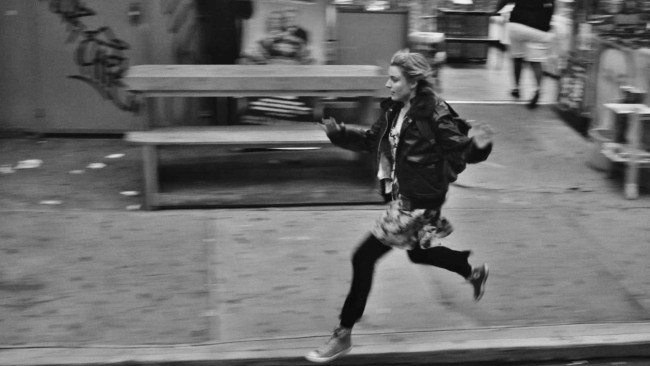Frances Ha
dir. by Noah Baumbach
Frances is lost, confused, and full-on adrift. But she knows she wants to dance, and dance she does, up and down Manhattan’s downtown streets; she twirls, skips, and pirouettes. She tap dances for money, pretends to fall, play fights with her best friend Sophie; but she does all this aimlessly, from one awkward dinner to the next—apartment to apartment, roommate to roommate. Girl’s got no roots.
A lot of people are bound—as they’ve already done—to compare Frances to Lena Dunham’s even more clueless Hannah Horvath, which is unfortunate since Frances isn’t nearly as insufferable or self-obsessed as herGirls counterpart. Watching Girls is a confounding experience unlike anything else on TV; it’s most frustrating: watching people that delusional lie to themselves so valiantly only to “eke” by on what are more-than comfortable living arrangements. You never get the sense that the ensemble on Girls are in any real threat of losing their homes, their friends, their jobs—their minds! They decry their woes and swear their lives have been stacked precariously, right on the edge of ultimate failure, of total self-destruction, but none of it comes across as anything more than self-aggrandized gobbledygook—whacky misadventures amongst the privileged white—like a terribly addictive blog that you know you’ll hate yourself for enjoying soon after you crash from the high. The characters are static and impossibly unaware.
Unlike Hannah and her coterie of uninspired ne’er-do-wells, Frances (Greta Gerwig) wages full-blown warfare against her awareness. She knows what’s up, but rather she didn’t. Lying is much easier; it staves off the depressing realities of her station in life: No Man’s Land. Her wheels are sputtering, but at least she has someone to sputter with: her main confidante, her platonic lover, her Sophie (Mickey Sumner). The film does a wonderful job of establishing their deep-rooted love—and dependence—for each other in the film’s very first scene by weaving together a tapestry of dialogue-free playfulness—for the strongest bonds aren’t necessarily the ones that have to be communicated; they can be tacit, too. In the film’s first two minutes, we see the girls play fight at the park, busk for money, trade quotes, share a cigarette, dance, play a banjo. We see them treat their summer days with luxuriant abandon. It’s this relationship that drives the film forward. Soon after the film’s light and breezy intro blows through, Sophie lets Frances know that she’s moving out by the end of the month. Frances is heartbroken. And virtually homeless. She can’t afford their apartment on her own and refuses to move in with her boyfriend. And so, on a journey she goes as she jumps from one apartment to the next. The film is broken up into sections, benchmarked by the various addresses she occupies along her picaresque jaunt through young adulthood.
Without digs to call her own, Frances holes up with a couple of hipster dudes who’re riding out their New York dreams—deflated and false as those dreams may be—on mommy and daddy’s dime. It’s there that Frances befriends Benji (Michael Zegen) who, too, has taken up residence in No Man’s Land, with the half-hearted illusion of breaking it big with a spec script for Goonies 3. It’s an empty mission. Benji always swears he has writing to do—he also claims to have a packet of skits he’s working on for SNL—but never gets around to it. Instead, he burns his days away with Frances in front of the TV. Benji has deemed Frances “undatable,” unfit for this world, unfit for anyone’s love. But Frances doesn’t want to date. That’s not what compels her to spin like a dervish—so ridiculously in place. She doesn’t want a man; she wants the promise of something more, a purpose of some kind. But not quite. She’s not ready for those next steps into adulthood. In order to do that she has to first shed her pretensions of the ideal life. She grips too tightly to her childhood dreams. She wants to be the star dancer in the company, despite her boss’s sensible advice to consider a career in choreography. The sad truth is that Frances will never be the star lead. She would have been better off with the office job. At the very least, it would have given her time to work on her choreography—while paying the bills. You know…the adult thing to do.
Frances is perpetually late to the game. After a particularly awkward dinner—of which there are several—in the company of real “adults,” Frances announces that she’s booking an impromptu trip to Paris. But for how long, Frances? Oh, just two days. It’s all her maxed out credit cards will allow. Without thinking about the change in hours, Frances spends most of her weekend battling off jetlag with a lengthy Rip Van Winkle slumber. All her time’s devoured in bed. Doesn’t really matter, though. Once out and about, there’s not much for her to do. The boutiques are closed, the food’s too expensive, and her only friend out there doesn’t answer Frances’s voicemail until Frances is back in NYC cabbing it through the Lincoln Tunnel.
In the film’s final act, Frances sinks further into her developmental quagmire by taking a literal trip down memory lane and moving back to her old college campus as an RA. In exchange for room and board, Frances caters at a fundraiser where she’s assigned to shadow one of the school’s wealthier alumni, a middle-aged woman who makes it her prerogative to seduce a male undergrad. It’s there Frances runs into a sloshed-up Sophie—a coincidental blessing. Sophie’s visiting from Japan with her fiancé Patch. She says it’s to give back to the school that’s taught her so much, but as her drink count tallies up into the double-digits, it becomes clear that she’s back at college—like Frances—to run away from life. Unlike Frances, Sophie’s taken a stab at adulthood in Japan with Patch; but it hasn’t stacked up the way she imagined it would. She doesn’t want to go back. She would rather move back to New York with Frances, into their old apartment, and turn into an old sexless spinster. But then the morning arrives and the veil is lifted; Sophie knows and accepts that this is the natural progression of life, that Japan and Patch are the next step. Her fears from the night before were fleeting, nothing more than growing pains, and so she leaves Frances with a letter and hops in a car and leaves. Frances almost catches Sophie on the way out, dashes after her car, and screams for her to stop, to come back—“SOPHIE!”—but it falls on deaf ears. The car keeps going.
Left behind, Frances stagnates alone. A heartbreaking moment: the dissolution of the film’s one true love story. All the same, it’s the swift kick in the ass Frances needs to get her shit in order. People don’t stop for you; they don’t wait for you to develop before moving on. The only person who’s capable of grinding your gears is you—especially when you’re as white and as pretty as Frances, and living in New York. When your major concern is impressing a guy you barely know with a snazzy meal at the expense of your tax returns, then the problem isn’t the external but the internal. It’s the personal peeves and hang-ups that crush you upon the wheel, not Fortune. And Frances eventually comes to grips with this, with her agency, and bargains with the cosmos for a compromise. She accepts the office job, choreographs a show, leases an apartment. She quits borrowing other people’s lives, other people’s addresses, and finds a nest of her own—a life of her own.
The film is presented in crisp black & white, and most of the shots remain static so as not to betray cinematographer Sam Levy and Baumbach’s choice of Canon 5D hardware. The scenes are carefully blocked and re-framed—only rarely—in order to avoid the 5D’s blurry shortcomings. In this case, the hardware’s shortcomings strengthen the film’s aesthetic form. The film’s typically so still that whenever there’s a burst of movement—such as the tracking shot from above of Frances sprinting and dancing through Chinatown to the tune of David Bowie’s “Modern Love”—you feel her elation, you want to sprint and dance, too, like a ballerina on the run. The moment’s effervescent. You halfway expect her to break free from all gravitational tethers and float up to meet the camera’s high angle.
The black & white works two-fold—as does the film’s many winks and nudges to the French New Wave of the late ‘50s and early ‘60s. Baumbach’s not the only one trying to invoke his favorite movies—so are the characters who crave so badly to be the artists they admire. They so badly want to be Truffaut—or at the very least, one of Truffaut’s characters. Lev (the ubiquitous Adam Driver) wears a Belmondo hat, Benji tucks cigarettes behind his ear, Frances high-wires the Seine in Paris like Jeanne Moreau in Truffaut’s Jim et Jules. True to the hipster credo, Frances and her buddies cop from all their favorite decades; their sense of fashion bolstered by the styles of yesteryear. They never think to forge ahead with anything new, but instead, whirl about in a fog of homage; they’re a group of people still stuck in the black & white of a time that will never be theirs.
Greta Gerwig is fine in the titular role. It’s a solid performance. But it’s nothing new either. Gerwig’s been playing the nebbish, dumpy, Woody Allen-type for some time now, starting back in her Mumblecore days. Her performance as Frances is the most resonant and purely distilled of her oeuvre only because she contributed a healthy portion of the script. Gerwig almost played the same exact character in Lola Versus, a much broader, and more colored, take on the world of the disillusioned hipster. Although, it should be mentioned that because Gerwig had a hand in writing the script—a delicate hand, mind you—Frances Ha thankfully transcends director Baumbach’s prickly predilection for vitriol. The film’s got mirth, and that’s definitely not a word I thought I’d ever use to describe a Baumbach film. Baumbach loves to watch people and things disintegrate. It wasn’t until Greenberg that Baumbach finally eased up and started treating his characters with at least a modicum of sympathetic reprieve. It shouldn’t be a surprise to note that Gerwig starred in Greenberg, too, as one of the film’s only personable characters.
Gerwig’s good for Baumbach. She brings the light out of him—the mirth! Ever since he’s started working with her he hasn’t hated people as much. The ennui has disappeared and been replaced with reticent optimism. Reticent, but optimistic all the same. His characters are more buoyant than before; they’re loose and limber, incredibly flexible, and—most importantly—easier to be with. Lost is the dour and acerbic pout of his earlier characters. I hope Baumbach continues to cast Gerwig in his films—like Godard did with Anna Karina—and heed her input when it comes to penning up scripts. It’s about time Baumbach’s shed the vestments of an “undatable” director and embraced the dance of life. The man was a sourpuss for far too long.
Check Us Out on Stitcher Radio






